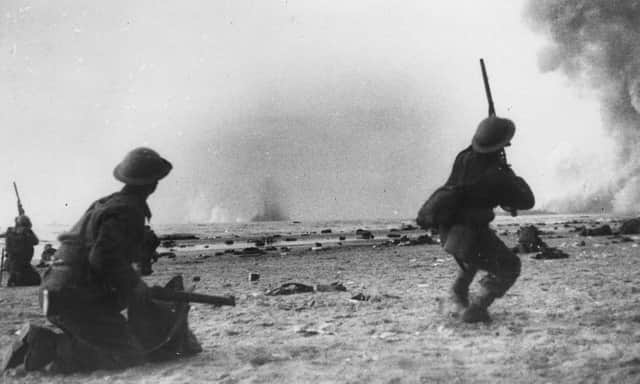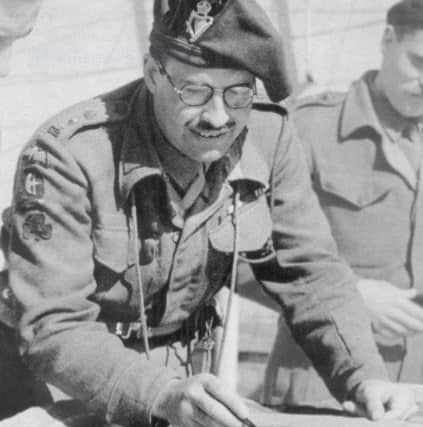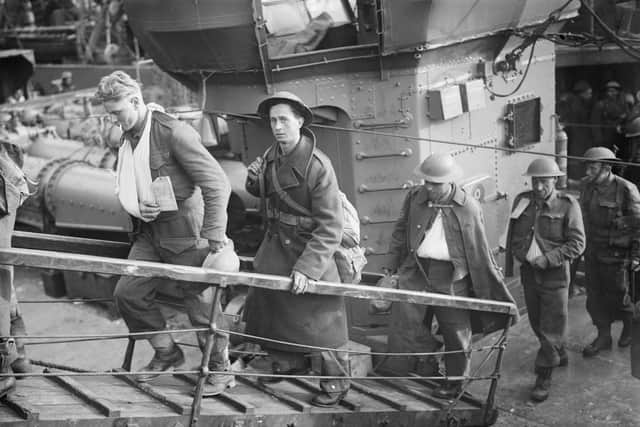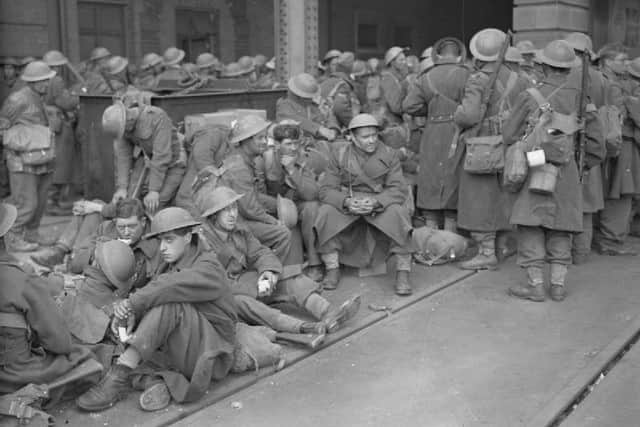Flotilla of little civilian boats 80 years ago epitomised the Dunkirk spirit


“Yes sir,” answered the steward, “Can I do anything for you?”
“Would it be possible to produce a glass of beer for me?” asked the man, “or if you can’t, a glass of water.”
Advertisement
Hide AdAdvertisement
Hide Ad“Yes sir,” said the steward, “by all means. But you know the rules, sir - I can’t supply you with any alcohol ‘til we’re three miles out.”


“How could we lose the war with people like this around?” the man thought to himself.
The man was Humphrey Edgar ‘Bala’ Bredin, the Acting Captain of ‘D’ Company, 2nd Battalion, Royal Ulster Rifles, who was leaving Dunkirk with around 50 men from his
battalion on an old paddle steamer.
He was well-known for preferring his army beret to his helmet!


Advertisement
Hide AdAdvertisement
Hide AdThe RUR was a key component in Operation Dynamo, the evacuation of around 350,000 soldiers from Dunkirk between 26 May and 3 June 1940.
They were amongst some of the last soldiers to leave, having been part of the rear-guard tasked with ‘buying time’ for the soldiers trapped on the beach, and ‘Bala’ Bredin was to become one of the best known officers in the regiment.
Public events here and in France marking the 80th anniversary of the evacuation have been cancelled, postponed and severely curtailed by Covid-19, but the flotilla of small civilian vessels that took part in the historic WWII operation, famously known as the ‘little ships’, gave rise to the term ‘Dunkirk spirit’ that’s been used more than occasionally during the current pandemic.
By 4 June, when the operation ended, 198,000 British and 140,000 French and Belgian troops were saved, but virtually all of their heavy equipment was abandoned.


Advertisement
Hide AdAdvertisement
Hide AdSix destroyers were sunk, along with eight personnel ships and around 200 small craft, from a total of around 860 vessels of all sizes.
A further 220,000 Allied troops were rescued by British ships from other French ports (Cherbourg, Saint-Malo, Brest, and Saint-Nazaire), bringing the total of Allied troops evacuated to 558,000.
Although the Germans had taken over a million Allied prisoners in three weeks at a cost of 60,000 casualties, the evacuation was a major boost to British morale and enabled the Allies to fight another day.
The evacuation was described as a ‘miracle of deliverance’ by wartime Prime Minister Winston Churchill and is regarded by historians as one of several events in 1940 that determined the eventual outcome of WWII.
Advertisement
Hide AdAdvertisement
Hide AdMajor-General ‘Bala’ Bredin’s chilling account of the evacuation can be read on the remembranceni.org website.
The Rifles had already marched from Louvain (Leuven), 29 miles east of Brussels, to Dunkirk where they held ground and fought around the perimeter of the embarkation area.
At the last minute the Rifles’ order to ‘fight to the last man’ was withdrawn and they had the chance to try to make it to the beaches and hope for evacuation.
They had to await rescue while under heavy fire and bombardment from the Luftwaffe and their ordeal wasn’t over
Advertisement
Hide AdAdvertisement
Hide Adthen, as those who were rescued still had to endure the treacherous journey back to England.
Acting Captain ‘Bala’ Bredin and his exhausted comrades from the Royal Ulster Rifles arrived at Dunkirk after their long and arduous march from Louvain during which they were constantly under fire.
“We got our last real position before getting into the crescent around Dunkirk,” ‘Bala’ Bredin recorded in his memoirs.
Their position was in marshy water meadows, with a canal in front of them.
Advertisement
Hide AdAdvertisement
Hide Ad“We were feeling very tired, and in the middle of the night, my second-in-command came round to see that we were alright. I woke up - and it took me about a minute to be able to actually stand up. I staggered around as though I was drunk.
And then I was reasonably normal again.”
His memories of being on the beaches are extraordinarily vivid - “Little groups of British soldiers sitting on the sand as though they were at a holiday resort, playing cards while Messerschmitt’s flew up and down. You could see the bullets hitting the sand one after the other down the beach, and these soldiers were saying ‘He can’t shoot very straight!’ when the bullets had missed them by a few yards.”
Acting Captain Bredin and about 50 men from his regiment went to the beach at La Panne where engineers had made a pier by driving army trucks into the sea at low tide putting duck-boarding along the tops of the vehicles.
“So we lined up by this pier and waited for a boat to come along. Nothing happened.”
Advertisement
Hide AdAdvertisement
Hide AdAfter an anxious wait they saw “an Isle of Man paddle steamer ...rocking to and fro because of the bombs dropping in the harbour, and we started getting on board. There was a dead man lying across the gangplank, and we stepped over him fairly gingerly.”
Three miles out at sea the steward brought the exhausted officer a glass of beer “and by this time I’d remembered myself,” Captain Bredin noted in his memoirs “and I made sure the soldiers got some as well!”
A message from the Editor:
Thank you for reading this story on our website. While I have your attention, I also have an important request to make of you.
In order for us to continue to provide high quality and trusted local news on this free-to-read site, I am asking you to also please purchase a copy of our newspaper whenever you are able to do so.
Advertisement
Hide AdAdvertisement
Hide AdOur journalists are highly trained and our content is independently regulated by IPSO to some of the most rigorous standards in the world. But being your eyes and ears comes at a price. So we need your support more than ever to buy our newspapers during this crisis.
With the coronavirus lockdown having a major impact on many of our local valued advertisers - and consequently the advertising that we receive - we are more reliant than ever on you helping us to provide you with news and information by buying a copy of our newspaper when you can safely.
You can also enjoy unlimited access to the best news from across Northern Ireland and the UK by subscribing to newsletter.co.uk
With a digital subscription, you can read more than five articles, see fewer ads, enjoy faster load times, and get access to exclusive newsletters and content. Visit https://www.newsletter.co.uk/subscriptions now to sign up.
Thank you